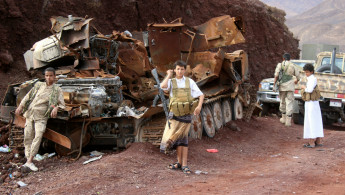Yemen's Houthi rebels 'recruited' thousands of child soldiers amid rise in practice due to Covid-19
Yemen's Houthi rebel group has forcibly recruited over 10,000 children since 2014, a report compiled by the Euro-Mediterranean Human Rights Monitor and the Yemeni NGO SAM for Rights and Liberties published on Friday said.
The report explained how the Iran-backed militia group uses schools and other educational facilities to “lure” children into their ranks.
The group “incites violence” and “teaches the group’s ideology through special lectures”, disseminating extremist ideas and encouraging children to prematurely join Houthi military forces, according to the report that was published to coincide with the International Day against the Use of Child Soldiers, which is also known as Red Hand Day.
“What is more troubling is not only the inclusion of children in military operations but feeding their simple minds with extremist ideas and filling them with hate speech and violence, and thus creating future extremists who may not be easily controlled given the huge number that the group recruits or aims to recruit in the future,” said Anas Jerjawi, the MENA Regional Director of Euro-Med Monitor.
This practice by the Houthi rebel group, who control the Yemeni capital Sana'a and most of northern Yemen, has been picking up speed since 2018, and they have now opened more than 50 camps for training children above the age of 10 years in Saada, Sana'a, Al Mahwit, Hodeidah, Tihama, Hajjah and Dhamar.
“The Houthis use complex patterns to forcibly recruit children and put them in hostile areas under its control in Yemen,” the report stated, documenting the names of 111 children who were killed in battle over a short space of time between July and August 2020.
Twitter Post
|
“The Houthis threaten Yemeni families in the villages and areas under its control to force them to allow recruitment of their children, including children in displaced camps and orphanages. In some cases, the group has recruited children from poor families in exchange for monetary rewards ($150 per month). They are sent to battlefronts to participate in direct clashes, laying mines and guarding military points.”
One of the children interviewed by the rights groups who co-authored the report, identified only as 14-year-old F.A. 14, said he had been recruited to fight on the frontline at Nihm.
“I was assigned with loading the guns and transporting them with foodstuffs to high, rugged areas. It was hard and exhausting. I used to get beaten and reprimanded when I arrived late. I cried a lot during those nights, fearing for my life and missing my mother, father and brothers,” he said.
Food deprivation, imprisonment, physical and sexual assaults, and death threats were commonplace punishing tactics, according to the testimonies of other children.
UN officials also warned that the impact of Covid-19 could increase the military recruitment of children across the globe.
“The impact of the Covid-19 pandemic is daunting: poverty and lack of opportunities increase even further push and pull factors for child recruitment and use by armed forces and armed groups as well as sexual violence or abduction,” said U.N. Special Representative for Children and Armed Conflict Virginia Gamba.
“Education opportunities, already disrupted by war and displacement, are further vanishing. Children are tragically paying the highest price and we have the joint responsibility to build a sustainable system that protects all children at all times."
UN figures say that 7,740 children, some even as young as si,x were recruited in 2019, and this recruitment happens in at least 14 countries including the Democratic Republic of Congo, South Sudan and Somalia.
“No one has the right to steal children´s dreams or their innocence. Children have a key role to play in building a present and a future where peace will prevail. It is our responsibility to enable them to be such agents of change,” Gamba said.





 Follow the Middle East's top stories in English at The New Arab on Google News
Follow the Middle East's top stories in English at The New Arab on Google News
![Israeli forces ordered bombed Gaza's Jabalia, ordering residents to leave [Getty]](/sites/default/files/styles/image_330x185/public/2176418030.jpeg?h=a5f2f23a&itok=_YGZaP1z)

